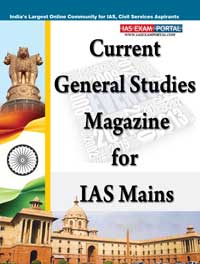Debate based Article : Current General Studies Magazine (April 2017)

Current General Studies Magazine (April 2017)
General Studies - II "Debate based Article" (Proposal to tax agricultural income)
Amnesia and ignorance don’t facilitate discourse, especially when indulged in by people who catapult themselves into it, without being aware of the present policy or its past evolution. This piece is not meant to stir the pot on agricultural income taxation further, but it will state some facts. First, Section 2 (1A) of the Income Tax Act defines agricultural income as rent/revenue from land, income derived from this land through agriculture and income derived from buildings on that land. Second, Section 10 (1) of the Income Tax Act excludes agricultural income from a computation of total income. Neither of these sections is dispute-free and chartered accountants and lawyers have been enriched via these. But broadly, these propositions are true.
Third, conditions on the sale of agricultural land vary from state to state. In some states, there is a requirement that land can only be sold to “farmers”. But not every state requires this. When there is a stipulation, there are no credible checks on “farmer’s certificates”, in addition to circumvention through the leasing route. Fourth, in the Seventh Schedule, Entry 82 in the Union List mentions taxes other than agricultural income, while Entry 46 in the State List mentions taxes on agricultural income. Therefore, arguing that this is in the State List is valid. But, if I have apoplexy at the mention of an agricultural income tax, there can be only two conclusions: I don’t know that some states tax agricultural income, or I am denying state legislatures their right to tax agricultural income.
Fifth, long before the Income Tax Act of 1961, there was the Income Tax Act of 1860, now forgotten. This was the introduction of income tax in India (in a modern sense) and it was meant to be temporary. Wonder of wonders, it taxed agricultural income till 1886. What changed in 1886, or between 1860 and 1886? The answer had more to do with general resentment against colonial rule, and less to do with agricultural income taxation directly. Sixth, in 1932, there was the Federal Finance Committee of the Round Table Conference and its report. If we have the present constitutional structure, that’s because of this report and the Government of India Act (1935).
Seventh, we have had Agricultural Income Tax Acts in Bihar (1938), Assam (1939), Bengal (1944), Orissa (1948), Uttar Pradesh (1948), Hyderabad (1950), Travancore and Cochin (1951) and Madras and Old Mysore State (1955). Eighth, this isn’t entirely history — we still have the Assam Agricultural Income Tax Act (1939), the Bihar Agricultural Income Tax (1939), the Kerala Agricultural Income Tax Act (1991), the Tamil Nadu Agricultural Income Tax Act (1955), the Orissa Agricultural Income Tax Act (1947), the Maharashtra Agricultural Income Tax (1962) and the Bengal Agricultural Income Tax Act (1944), or so I think.
Unlike the Karnataka Agricultural Income Tax Act (1957), repealed in 2016, I am not aware of these statutes having been repealed. Therefore, it isn’t true that states don’t tax agricultural income, though it’s true that they tax some kinds of agricultural income, such as plantations. Ninth, it isn’t as if this issue was discovered yesterday. The issue of taxing agricultural income (and wealth) goes back to the 1960s. There must be a unified system of taxation across states. Agricultural income taxation must be integrated with non-agricultural income taxation. Land revenue tax hasn’t quite worked and must be replaced.
There is a considerable amount of literature from the 1960s and 1970s, based on such principles. To those who wonder about how an agricultural income tax will be implemented, may I suggest reading the 1972 Raj Committee Report on Taxation of Agricultural Wealth and Income. You don’t have to agree with the committee’s agricultural holding tax idea, but it isn’t as if no one has thought about implementation. May I also suggest the Fourth Five Year Plan (1969-74) document and the report of the Fifth Finance Commission (1969) as well? Indeed, if one looks for strong arguments in favour of agricultural income taxation, one will find them in the report of the Taxation Enquiry Commission (1953-54).
Tenth, there can be problems with generalisations. I guess, in logic, this would be called a fallacy of composition: Epimenides is poor; Epimenides is Cretan. Therefore, all Cretans are poor. Now, read “farmer” instead of Epimenides. Not realising there are thresholds, irrespective of whether in agriculture or non-agriculture, is a deliberate attempt at obfuscation. Eleventh, in 2002, there was the report of the Vijay Kelkar Task Force on direct taxes. This made the point that not taxing agricultural income violates horizontal and vertical equity and it “encourages laundering of non-agricultural income as agricultural income, that is, it has become a conduit for tax evasion. Both the arguments are empirically verifiable.”
This empirical validation was done on the basis of tax returns in Mumbai. This report proposed, “A tax rental arrangement should be designed whereby states should pass a resolution under Article 252 of the Constitution authorising the Central government to impose income tax on agricultural income. The taxes collected by the Centre would however be assigned to the states. Most agricultural farmers would continue to remain out of the tax net.” At that time, estimates were that 95 per cent of farmers would be below the threshold.
And twelfth: Consider some figures from an RTI application filed by Vijay Sharma last year. In 2012, 8,12,426 individual tax payers disclosed agricultural income. The average income per individual assessee was Rs 83 crore. Do the multiplication and the mind boggles. In assessment year 2015-16, 307 individuals reported an agricultural income of more than one crore rupees a year. In 2014-15, a company made profits of Rs 215 crores, but claiming the agricultural income exemption, it paid no tax.
(Source- The Indian Express)

